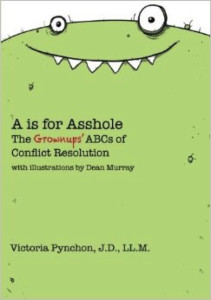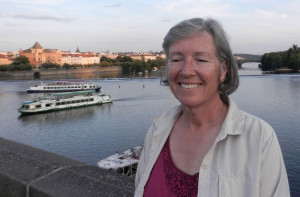By Michele Straube for EDRBlog.org
 While preparing for a particularly difficult facilitation recently, I decided to consult my Conflict Resolution Reading List for inspiration. I rediscovered some of my favorite books and indeed went into the meeting with confidence and a smile (and the meeting went well).
While preparing for a particularly difficult facilitation recently, I decided to consult my Conflict Resolution Reading List for inspiration. I rediscovered some of my favorite books and indeed went into the meeting with confidence and a smile (and the meeting went well).
- The first book on the list has the most inspiring title ever. A is for Asshole: The Grownups’ ABCs of Conflict Resolution, by Victoria Pynchon, contains great insights and illustrations. This short book identifies the multiple personalities of individuals in conflict and for each one gives a brief synopsis of effective approaches to disruptive behaviors. From “D is for Drama Queen” to “P is for Paranoid”, and ending with (spoiler alert) “Z is for Zen Master,” this book will validate your concerns about conflict while giving you plenty of ideas for how to overcome them.
- How to Talk So Kids Will Listen & Listen So Kids Will Talk, by Adele Faber and Elaine Mazlish, seems out of place on a professional’s conflict resolution reading list. Yet, the communications skills outlined in this book are effective in all situations. And let’s face it, isn’t just about every adult you’ve dealt with really just an overgrown kid, especially when they’re in conflict?!
My biggest takeaway from this book is to treat with respect the person with whom you are trying to communicate. Regardless of how angry you or they are or how little you may agree with each other’s perspective, treating the other person with respect will change the dynamic of the conversation immediately. The book always reminds me that treating people with respect has two components to it: respect is a mindset and it is reflected in behavior.
Some basics from the book that help me in difficult facilitations: Listen, listen and listen again to make sure you’re hearing what they are saying, not what you expect them to say. Acknowledge their emotions, helping the individual speaking to feel “heard”. Respond to the facts and issues, don’t attack or judge the person. If the conversation seems stuck, ask more questions and listen some more. And finally, ask them how they might solve a problem (rather than assuming that your solution is perfect).
- My final set of “go-to” books build on Getting to Yes: Negotiating Agreement Without Giving In, by Roger Fisher and William L. Ury (updated revised edition published in 2011).
The original book, published nearly 30 years ago, outlined a problem-solving approach to negotiations that has informed every collaborative process in which I’ve been involved. Rather than starting with a desired solution, Fisher and Ury encourage open conversation about underlying needs or “interests”, in order to uncover opportunities for “mutual gain” and settlement “options” that will be satisfactory to both parties.
Lawrence Susskind and Patrick Field apply the basic Getting to Yes principles to multi-party public policy conflicts in Dealing With an Angry Public: The Mutual Gains Approach to Resolving Disputes. Using many real-life examples (successes and not-such-successes) to illustrate the key principles, this book provides highly practical guidance for corporate and government leaders working in potentially volatile public environments. Building on the interest-based negotiation approach outlined above, Susskind and Field encourage honesty, transparency, respect, collaborative problem-solving, and relationship-building as the cornerstones of transforming an angry public into (at a minimum) a quiet crowd or (at best) a group of supportive partners.
 I can’t wait to read the next book in the Getting to Yes series: Getting to Yes with Yourself (and Other Worthy Opponents), by Wiliam Ury, published in January 2015. According to the reviews, this book will help each of us stop being our own worst enemy in conflict situations.
I can’t wait to read the next book in the Getting to Yes series: Getting to Yes with Yourself (and Other Worthy Opponents), by Wiliam Ury, published in January 2015. According to the reviews, this book will help each of us stop being our own worst enemy in conflict situations.
Michele Straube is Director of the Environmental Dispute Resolution (EDR) Program at the Wallace Stegner Center, S.J. Quinney College of Law, University of Utah.
